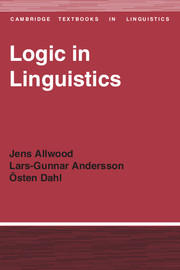Book contents
- Frontmatter
- Contents
- Preface
- Symbols and notational conventions
- 1 Logic for linguists
- 2 Set theory
- 3 Inference and logical analysis of sentences
- 4 Propositional logic
- 5 Predicate logic
- 6 Deduction
- 7 Modal logic
- 8 Intensional logic and categorial grammar
- 9 Further extensions
- 10 Logic for linguists?
- References
- Answers to exercises
- Index
3 - Inference and logical analysis of sentences
Published online by Cambridge University Press: 05 June 2012
- Frontmatter
- Contents
- Preface
- Symbols and notational conventions
- 1 Logic for linguists
- 2 Set theory
- 3 Inference and logical analysis of sentences
- 4 Propositional logic
- 5 Predicate logic
- 6 Deduction
- 7 Modal logic
- 8 Intensional logic and categorial grammar
- 9 Further extensions
- 10 Logic for linguists?
- References
- Answers to exercises
- Index
Summary
Inference
Compare the following two arguments
(1) All John's friends are my friends
All my friends are nice
Therefore all John's friends are nice
(2) None of John's friends are my friends
None of John's friends are nice
Therefore none of my friends are nice
We immediately notice the difference between (1) and (2): if we reason as in (1), we think correctly, and if we reason as in (2), we think incorrectly. We will say that in (1) the conclusion (the sentence beginning with therefore) follows from the premises (the sentences the argument uses as a base, here the first two sentences of (1) and (2)). When a conclusion follows from its premises it is always the case that if the premises are true, then the conclusion will also be true. In (2), it is not certain that the conclusion would be true even if the premises were true. It could be, but this would not depend on its relation to the premises. In (1), however, we can be sure that if the premises are true the conclusion is also true. (1) is therefore a logically valid inference.
One of the most important aspects of logic is the study of valid inferences and sentences that are necessarily true. There are two main types of inference: those that are necessarily valid and those that are valid only with a greater or lesser degree of probability.
- Type
- Chapter
- Information
- Logic in Linguistics , pp. 15 - 25Publisher: Cambridge University PressPrint publication year: 1977

